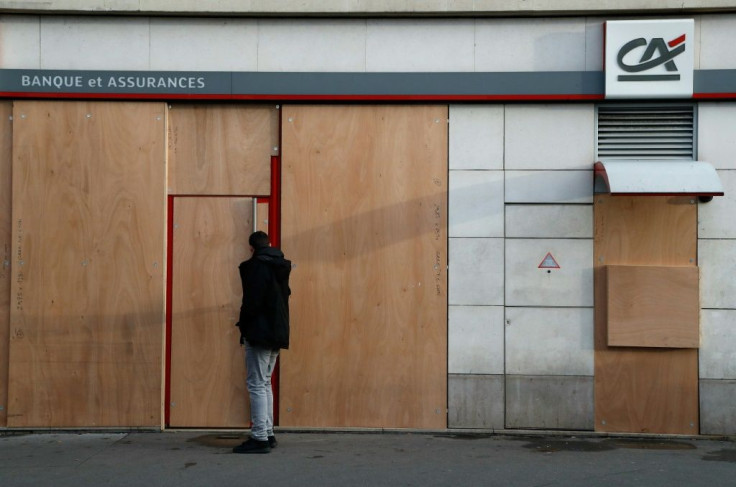Should You Board Up Your Store?

Amidst the COVID-19 pandemic and of late, the riots protesting George Floyd's death, city dwellers have been forced to behold many surreal sights: streets with no cars, buses and trains absent of passengers, sidewalks with noticeably less foot traffic -- and storefronts with boarded-up windows. Around the U.S., and even the world, retailers both small and large are signaling that they're not just closed up for the night, either by covering their storefronts with plywood, papering over their windows, or shuttering their facades with metal grates. Should you follow suit?
It's a difficult decision for a retailer or restaurateur to make. Even as some states have begun to partially lift their statewide closure orders, the majority of commercial activity remains at a standstill. Faced with this uncertainty -- when will we be able to reopen our business? When will customers feel comfortable coming in our doors again and being in a small space around others? When will consumers decide to resume their normal levels of shopping again? -- retailers might well wonder how do they protect their vacant storefronts from the risk of damage and neglect, either due to the natural elements or at the hands of humans? On the other hand, what sort of message does a boarded-up storefront send?
Advantages of Boarding Up Your Storefront
Boarding up your windows, either by covering them with plywood, painting them, or simply covering them with paper, obviously makes it harder for people to see inside. For those individuals who may view an unoccupied building as an easier target for a break-in opportunity, this can be an effective tactic for reducing the risk of your business becoming a target of theft or vandalism.
Some cities have noted a rise in graffiti that has coincided with the business shutdowns and stay-at-home orders. So, an additional reason to either cover or barricade your storefront is to save you the expense of removing any such scribbling. And since things that normally deter acts of graffiti-heavy foot traffic or the presence of security officers-are harder to secure at this time, placing barriers in your windows or simply painting them can save you any future costs of removal.
It is also reasonable to fear natural wear and tear from the elements or from long periods of vacancy. Without a full operational staff entering and exiting the building and walking the floor, you lose the eyes and ears that would otherwise just naturally be monitoring the physical structure of your store.
Many businesses already have a standard policy in place for what precautionary measures to take in the event of a natural disaster or another potentially disruptive activity. In the past, retailers have made the decision to bar off their stores when there is a hurricane warning, in the wake of a hurricane or tornado, or in anticipation of a nearby protest.
Disadvantages of Boarding Up Your Storefront
However, the pandemic situation is unprecedented in that it is a public health emergency, not a severe weather event or an act of civil disruption. When deciding how to move forward, retailers may also want to consider how the public will respond to the visuals of a shuttered storefront.
Syama Meagher, the CEO of Scaling Retail, a consulting and brand marketing agency based in L.A. and New York, believes that boarding up windows and storefronts is bad optics for retailers. It has the potential to send a message that you've permanently closed your business and are not re-opening in the future, even when restrictions are lifted.
In addition, when you place physical barriers in front of your store, you are projecting a message to the community around you that you fear it will do further harm to your business. Boarding up your windows can communicate a message that you are expecting chaos and lawless behavior from your neighbors. Given that building trust with customers and the community has always been crucial to the success of small- and medium-sized businesses in particular, this is not a good message to send.
According to Meagher, the shuttered facades of buildings are a symptom of the understandable fear and uncertainty surrounding the pandemic, but they may also be adding more fear and unease to the situation. She references the criminologists' broken window theory, which argues that small but visible crimes or signs of anti-social behavior and civil disorder encourage more serious crime and additional disorder. Of course, sealing off your own storefront isn't illegal, but you can argue it is anti-social, and creates negative feelings.
There is also the additional expense of installing, maintaining, and then removing plywood over storefronts when your store reopens in the future. You may not be able to count on employees to remove the barriers if you don't immediately re-open at full staffing capacity.
Communicate Your Intentions
For businesses worried about safety and crime, options other than boarding-up do exist. One way to proceed is to remove all valuable merchandise from your storefront, leave the lights on where you can, and hire extra security if possible. But leave the facade of the building untouched.
For business owners who still feel that physically covering their exterior is the best decision, Meagher encourages the addition of a sign in the storefront, even if it is handmade, explaining their intentions. "At the end of the day, retailers who are communicating will come out on top," she says.
On top of a public health crisis, the COVID-19 pandemic does not need to be a communications crisis. There is a way to protect your business and protect the trust that you have worked so hard to build with your customers. Take the extra step of reassuring them that you are coming back and that your precautions are meant to create a better retail experience for them in the future.
© Copyright IBTimes 2025. All rights reserved.





















